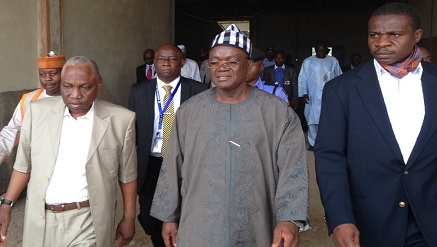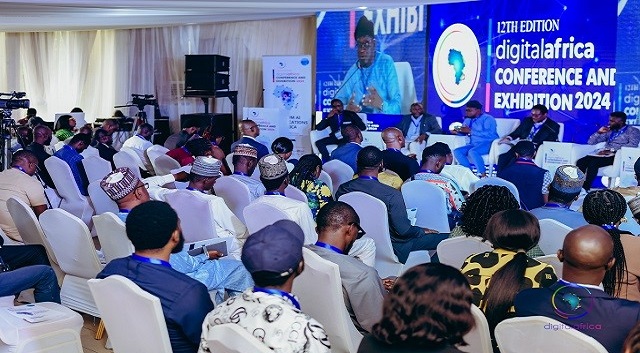General News
FG Rules out Sabotage in Kaduna Airport Fire

The federal government on Tuesday ruled out sabotage as the likely cause of the fire incident at the control tower of the Kaduna Airport.
Dr. Samuel Ortom, supervising minster of Aviation, after undertaking an inspection tour of the Airport and the debris of the Control Tower, explained that preliminary investigations revealed the unlikelihood of sabotage as the cause of the fire in view of the tight security at the airport.
However, the Accident Investigation Bureau (AIB) and other relevant agencies have commenced investigations to identify the remote and immediate cause of the accident.
The Airport has commenced operations following the deployment of a mobile emergency control tower from Abuja.
Yakubu Dati, coordinating spokeperson, Aviation Parastatals, in a statement on the incident, said that, earlier, Ibrahim Abdulsalam managing director of the Nigeria Aviation Management Agency (NAMA) while conducting the minister round the burnt tower assured the minister that all hands are on deck to return the situation to normalcy.
The Minister who was accompanied by Directors from the ministry and Heads of parastatals also inspected the on-going remodelling projects.
Engineer Saleh Dunoma, managing director of the Federal Airport Authority of Nigeria (FAAN) while conducting the minister round the Terminal building, also said a new terminal is being rebuilt to serve the ever growing economy of the vibrant state.
The Minister gave a directive for the speedy completion of the project because of the strategic location of Kaduna as a former regional capital.
The Supervising Minister was also accompanied on the inspection by the Engr. Benedict Adeyileka, Acting Director General of the Nigerian Civil Aviation Authority, Capt Sam Caulcrick, Rector of Nigeria College of Aviation Technology.
General News
SEC Advocates for Advanced Financial Inclusion by 2030

The Securities and Exchange Commission (SEC) has noted the need for Nigeria to harness its demographic dividend to advance financial inclusion through investments by 2030 for national survival or face deepening inequality.

Emomotimi Agama, Director General, SEC, said this at the United Capital Asset Management Investment forum held Wednesday in Lagos.
Agama, in his keynote address titled: “Advancing Financial Inclusion through Investments: Bridging Nigeria’s Knowledge and Wealth Gap,” said Nigeria must harness its demographic dividend to boost investment.
“Our theme, Advancing Financial Inclusion through Investments, is not aspirational; it is foundational to national survival.
“We stand at a pivotal moment. By 2030, Nigeria can either harness its demographic dividend or face deepening inequality. The knowledge-wealth gap is not merely an economic challenge; it is a moral imperative,” Agama said.
He said the term inclusion should be reframed as active financial involvement, where access meets empowerment, and capital becomes a tool for transformation.
Agama said that closing the financial inclusion gender gap could lift 700,000 Nigerians from poverty.
He said, “Nigeria has a great population yet we have a tiny drop of this number of persons involved in the capital market.
That’s one reason for poverty, because we are running from money. We have to do something. Our market capitalisation is an opportunity to do something, we all have.
“We need to change the narrative and move the market forward. We must reach out to make the difference. We are committed to protecting investors and developing the market. Our goal is to do the right thing no matter whose ox is gored. We will work by the principles of fairness and equity to change the market. We will provide a fair ground for everyone to aspire.
He noted that MTN Nigeria’s share offering drew 150,000 new investors – 75 percent women, 85 percent under 40. Agama recommended a four-pillar strategy for bridging the gaps.
He listed the four-pillar strategy as democratisation of financial knowledge, catalyse MSME Investment Channels, blended Finance Vehicles: Partner with Bank of Industry (BOI) to de-risk loans for women-led SMEs.
“We need to educate people about finances. As we drive this market, we do so for a purpose, I enjoin everyone to be the disciple and the apostles. Getting this market to move is a deliberate action,” he added.
General News
OpenAI Unveils New AI Agent for Software Developers

OpenAI has launched Codex, which it regards as its most capable AI coding agent available to ChatGPT Pro, Enterprise, and Team subscribers.

Users will have ‘generous access at no additional cost’ for a few weeks, after which OpenAI plans to introduce pricing options and rate-limited access.
Codex, a cloud-based software engineering agent, can write features, answer questions about a codebase, fix bugs, and propose pull requests for review. Several tasks can run simultaneously, and users retain full access to their computers while the agent takes anywhere from one to 30 minutes to complete a task.
The research preview of Codex offers powerful code-writing, debugging, and collaboration features, which mark a major step in OpenAI’s push to automate software development.
“We imagine a future where developers drive the work they want to own and delegate the rest to agents—moving faster and being more productive with AI,” OpenAI said.
Since it is still in research preview, the tool remains in early development. “It currently lacks features like image inputs for front-end work, and the ability to course-correct the agent while it’s working,” the firm said in a blog post.
Additionally, delegating to a remote agent takes longer than interactive editing, which can take some getting used to, it stated. Over time, however, the company said using the service will feel more like asynchronous collaboration with colleagues.
The launch comes as part of a broader rise of AI tools for software engineers that are meant to handle repetitive, boring tasks rather than take over the whole gamut.
OpenAI is reportedly in talks to acquire Windsurf, a maker of AI coding tools, for around $3 billion, which is potentially its largest acquisition to date.
General News
Africa Gears Up For Digital Sovereignty At 13th Edition Of Digital Africa Conference 2025

Africa’s digital destiny will on October 28-29, 2025, take centre stage at the 13th Edition of the Digital Africa Conference & Exhibition (DACE), to be held at Merit House, Abuja, under the theme: “Sovereign Intelligence: Africa’s Voice in the Global Digital Order.”

At a time when artificial intelligence (AI), smart systems, and data technologies are reshaping societies, economies, and governance structures worldwide, DACE 2025 is sounding a clarion call: ‘Africa must lead, not lag in this transformation.’
Organizers say the aim is to move beyond consumption and dependency, and instead position the continent as a proactive contributor to global digital norms and governance.
“This year’s conference is about shifting from passive adoption to active leadership,” said Dr. Evans Woherem, Chairman, Digital Africa Consult, organisers of the event. “Sovereign Intelligence is more than a concept, it’s a movement to ensure that Africa controls its digital resources, designs its own ethical frameworks, and asserts its voice in shaping global technology norms.”
A Defining Moment for Africa’s Digital Future
Woherem said the conference will serve as a high-level, cross-sectoral platform aimed at positioning Africa as a co-author of global AI governance standards, rather than a mere recipient, assuring that the conversations are expected to align closely with the African Union’s Continental AI Strategy, advocating for a united, self-determined digital ecosystem across the continent.
“The urgency of this moment cannot be overstated. As the world builds its digital infrastructure, much of the technology consumed in Africa is still imported, foreign-owned, and culturally disconnected. African data is often stored offshore, local languages and cultural contexts remain invisible in AI systems, and African experts are frequently excluded from global decision-making tables.
“This must change. Digital Africa 2025 is about taking control of our data, our narratives, and our technological development. Africa must move from being users of foreign systems to creators of our own,” Woherem added.
Key Objectives of DACE 2025
One of the primary objectives of this year’s event is to advocate for African ownership of digital infrastructure, data policies, and technology standards. Organizers hope to inspire African leaders and institutions to say yes to innovation and regulation built by Africans, for Africans.
Another major focus will be amplifying African voices on the global stage. This involves not only advocating for inclusion in international policy dialogues but also ensuring that African values, cultures, and wisdom shape the design and deployment of AI systems worldwide.
“The conference will also spotlight homegrown innovation. Startups and developers from across the continent will showcase digital solutions addressing local challenges in healthcare, agriculture, finance, and education. These practical examples will reinforce the message that Africa is already generating intelligent, scalable answers to complex problems,” said Nneoma Ofodile, General Manager, Digital Africa.
Empowering young Africans through digital skills, research opportunities, and leadership training is another key goal of the gathering. Organizers are committed to fostering a new generation of African tech leaders who can confidently shape global digital trends from a place of knowledge and ownership.
Regional cooperation will be front and centre, as DACE encourages cross-border collaboration on harmonizing laws, sharing infrastructure, and building integrated digital ecosystems. Sessions will explore how African nations can jointly develop policies and platforms that reflect the continent’s unique needs and aspirations.
While global partnerships will also be on the agenda, the conference aims to deepen Africa’s engagement with international institutions such as UNESCO, the UN, and the OECD, not as passive participants but as co-authors of global standards for ethical and inclusive AI.
Nneoma said that throughout the two-day event, attendees can expect high-level discussions on digital law, tech sovereignty, and innovation policy, alongside practical workshops for developers, educators, and youth. Innovation showcases will highlight the work of African tech hubs, while strategy sessions will promote cross-country digital alignment.
At the close of the event, a concrete roadmap is expected to emerge—outlining actionable steps toward achieving digital sovereignty across the continent. The conference will also aim to strengthen networks among African innovators, regulators, and thinkers, while increasing the visibility of African insights in international technology policy.
Above all, Digital Africa 2025 is about reclaiming agency. “This isn’t just a technology conversation,” Nneoma emphasized. “It’s about power, voice, and independence. Africa must not only catch up; Africa must lead.”
As preparations intensify, DACE 2025 is inviting visionary organizations, sponsors, and partners to join the mission of building a digitally sovereign and inclusive Africa.

 Telecom2 days ago
Telecom2 days agoLebara, New Operator Enters Nigerian Telecom Arena, Sells Minutes, Not Airtime

 E-Business2 days ago
E-Business2 days agoOver 7m Streaming Accounts’ Credentials were Leaked in 2024 – Report

 General News1 day ago
General News1 day agoOpenAI Unveils New AI Agent for Software Developers

 E-Financial2 days ago
E-Financial2 days agoFidelity Bank Uplifts Old People’s Home with Essential Items Donation

 E-Financial2 days ago
E-Financial2 days agoS&P Global Ratings Downgrades Ecobank Nigeria’s Credit Rating to CCC-, Outlook Negative

 Telecom2 days ago
Telecom2 days agoPIN Pushes for Equitable Digital Governance at World Internet Forum

 Telecom3 days ago
Telecom3 days agoMTN Says New N6.98 USSD Charge Won’t Affect Airtime Recharge

 Telecom1 day ago
Telecom1 day ago15 African Startups Using AI Selected for Google Accelerator Cohort 9


























